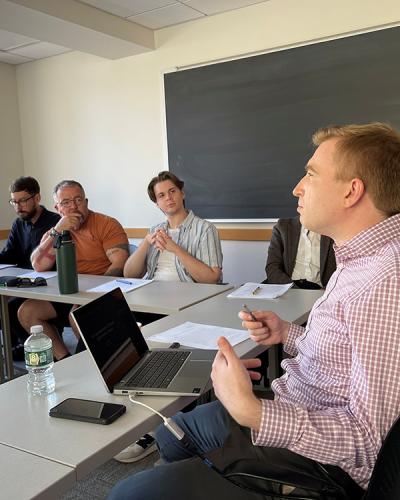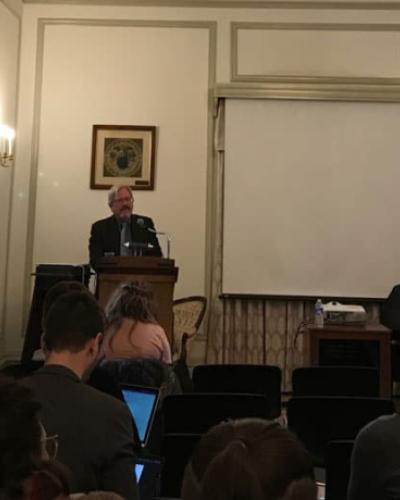March 22, 2019
On Friday, March 22nd, the German Studies Graduate Student Conference kicked off its first panel by focusing on the philosophical problems involved in using pronouns. The panel featured papers on Hegel by Emir Yigit (Cornell, German), on Kant and Descartes by Søren Larsen (Cornell, German), and on contemporary analytical approaches by Alec Pollak (Cornell, English). It opened a dialogue about the conceptual frameworks available for thinking pronouns as systems of reference, highlighting not only the epistemological, but also the ethical and cultural dimensions that condition gestures of naming and indexing. In "I-Thou-We: Hegel on the Restless Genus of Subjectivity,” Yigit analyzed the metaphysical substance of the transition from singular (I) to plural (we) subjectivity in Hegel’s Phenomenology of Spirit. Yigit understands this transition as a social and ethical complication of Hegel’s contemporaneous natural scientific discourse, holding that tensions around the biological concept of “genus” are worked out in the mediation, effected by social processes of “desire and violence," between organisms taking up the positions of “I,” “you” and “we.” Thus in Hegel, pronouns offer a window into “the logical movement between meronomical and taxonomical relations that consciousness pursues in its path to self-certainty.” In the presentation titled "I, or He, or It (The Thing), Which Thinks,” Larsen traced the philosophical afterlife of the Cartesian cogito, demonstrating that the first-person perspective assumed in Descartes’s famous proposition “I think, therefore I am” is an over-specification of what is phenomenologically ambiguous (strictly speaking “it thinks, therefore it is”, before “it” has been properly shown to be what we call “I”); an over-specification that can be traced from Descartes into Kant through the latter’s explication of the famous Transcendental Unity of Apperception. Using psychoanalytic techniques, Larsen read the lacuna that remains inherent to the Kantian appropriation of the cogito not as a breach of the metaphysical system, but as a symptom revealing the structure of desire at the heart of Kantian economies of reference. Finally, in the presentation titled “The Universal Use of They/Them/Theirs: An Exploration of the Potentials of Pitfalls of Gender Neutrality,” Pollak concluded the panel by interrogating the recent argument, advanced by Dembroff and Wodak, that “we have a moral duty to universalize the use of they/them/theirs as third-person gender-neutral pronouns for all subjects, regardless of gender and self-identification”. While agreeing with the premise that “the presence of gender markers in language is directly proportional to a native speakers’ internalization of socially-prescribed gender-roles,” Pollak argued that the universalization of gender-neutral pronouns does not constitute a “gender elimination” approach because it obscures the penetration of gendering processes of culture in language “beyond pronouns and names.” Drawing on feminist critiques of “gender neutrality” as an implicit perpetuation of the “standard” character of masculine-coded modes of identification, Pollak sought to formulate solutions for internalized femmephobia in philosophical activism. (Juan-Jacques Aupiais)
Keynote
March 22, 2019
In his keynote address, entitled “Multiple Voices, Unruly Identities,” Professor Brian Richardson (University of Maryland, English and Comparative Literature) drew on his formidable expertise to review several recent literary examples featuring unusual narrative structures and acts of narration. His samples were meant to showcase what he deems an increase in narrative pronouns other than the traditional “I," which might entail an “I” whose referent does not remain fixed, a “we” that stands in for a community of thousands, or a “you” that resembles an “I” talking to itself.
Moving swiftly through a variety of newer literary forms—from the “autofiction” of Ben Lerner’s 10:04, to the made-for-twitter format of Jennifer Egan’s Black Box, to the “qualified omniscience figured by the “we” of village gossip in Zakes Mda’s Ways of Dying—Richardson suggested that when it comes to pronouns, scholars should not limit themselves to strict linguistic definitions but rather “explore and model what authors actually do,” even though (or precisely because) authors appear to delight in undermining the expectations of literary scholars. In dealing with narrators that seem impossible, contradictory, or even post-human, it becomes clear that, as Richardson puts it, “transformation of the predominant narrating pronoun can in and of itself follow a kind of plot trajectory.” Richardson ended his talk by suggesting that the manner in which pronouns are employed by authors tells a story of its own. (Mark Mandych)
March 23, 2019
Saturday, March 23, marked the second day of the German Studies Graduate Student Conference, which started with a paper by Alex Brock (Princeton University) entitled “Royal Pronouns and Royal Power in Shakespeare’s Richard II.” Brock’s presentation explored Richard II’s shifting use of personal and royal pronouns at the moment when he loses his throne to his nephew Bolingbroke, who will soon become Henry IV. This shift in personal and royal address raises the question of what it means to be recognized in one’s claim to political rule. Brock argued that the grammatical struggle between the diverse forms of address expresses a complex network of power relations. The panel continued with a presentation by Elisabeth Schoppelfrei (Penn State University) titled “Why’s he so upset? – Trans Voice and Poetry Slam,” which addressed the question what it means to identify and produce a “trans voice” in the specific context of poetry slam. Drawing on theories from sound, queer and trans studies, Schoppelfrei argued for a multidimensional conceptualization of trans voices that necessitates listening to the interchange and movements of bodies, voices, audiences, poets, institutional apparatuses, affects, histories of racialization, and gender and ungendering processes. Cosima Mattner (Columbia University) concluded the panel with a paper entitled “Destabilizing Deixis with Embodied Performative Presence –Bodies of Pronouns in René Pollesch’s Kill Your Darlings.” She analyzed forms, functions and bodies of pronouns in Pollesch’s work, relating them to a post-dramatic critique of the subject.
The last panel of the conference’s second day began with a talk by Florenz Gilly (Humboldt University Berlin/Cornell University) on Wilhelm Raabe’s Horacker, which reflected on the novelist’s distinctive use of the pronoun “man.” Gilly argued that Raabe’s ambiguous use of the pronoun opens up a space for speculation meant to allow a German audience to build social and ultimately political consensus without defining their particular identities. The panel continued with Marius Reisner’s (HU Berlin) talk entitled “The Pronoun With(out) Qualities”, in which he explored a central scene in Robert Musil’s “Die Verwirrungen des Zöglings Törleß.” In a non-heteronormative encounter between two characters, a change in the gender of pronouns occurs, which Reisner read as the “metaphorical disclosure” of a form of intimacy that could not be otherwise admitted or disclosed. Through the feminization of the pronoun, Reisner argued, the non-heteronormative relation escapes conceptual closure. The panel concluded with a paper by Michael Paninski (Brown University) titled “gender_pluralities - Notes on translating Barbara Köhler’s Niemands Frau.” The talk investigated Köhler’s poem cycle with a focus on the production of subjectivity through the pronoun “I”. Paninski argued that translating this text from German involves a confrontation with the ambiguous question of otherness as implied in the construction of a demarcated I. (Emir Yigit)





